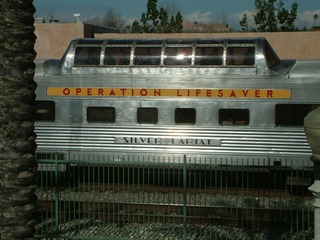
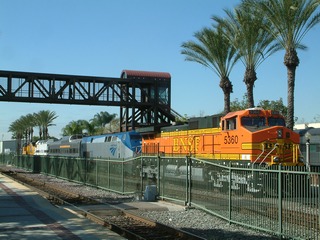
On February 9, 2005, Metrolink
announced an "officer-on-a-train" event set for February 16, 2005, via
press release. I was already aware of this event having found out
at the January 26, 2005 Operation Lifesaver quarterly meeting in Los
Angeles. The meeting was coincidental with the day one supposedly
suicidal person caused a deadly train derailment in Glendale California
in which 11 people died and 3 trains derailed. On my way to
Metrolink's Central Maintenance Facility at Taylor Yard in Glendale, I
heard an AM radio report from Fullerton where law enforcement was
already working a 4 mile stretch of the Burlington Northern Santa Fe
Railroad. The Operation Lifesaver special "officer-on-a-train"
was scheduled to depart CMF at 9:00 AM. It left a few minutes
late and was wyed at Los Angeles Union Station to have locomotive BNSF
5360 lead the train to Fullerton. For a view of the outbound
trip,
click
here.
The usual
crew was in attendance on the train
with members of the Southern California Rail Safety Team and the La
Mirada HamWatch. With no traffic to impede the special train, it
arrived at Fullerton by 10:15 AM. With the January rail disaster
fresh on everyone's minds, the local media was also out in force.
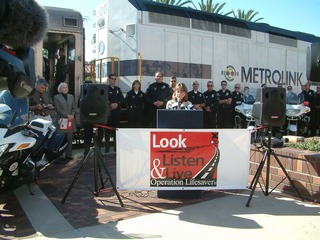
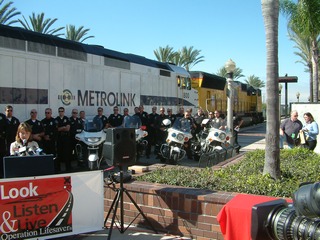
The Officer-On-A-Train program is
part of a statewide rail safety
awareness campaign sponsored by California Operation Lifesaver, a
national, non-profit highway-rail safety education education
organization. During the event local law enforcement officers
ride in the locomotive of a special train to witness what train
engineers observe daily as people attempt to beat a train. As the
train moves along the tracks the officers in the train will be in
contact with officers on the streets to issue citations to motorists
driving illegally through rail crossings or pedestrians trespassing on
the tracks.
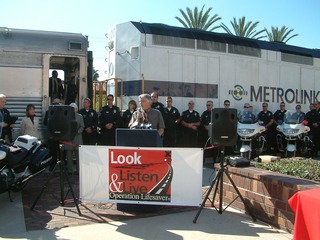
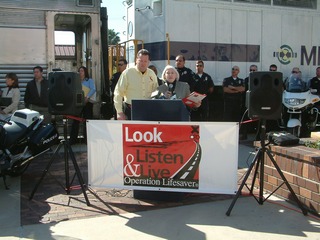
Soon after the arival of the special
train, the press conference began. Speakers included Susan
Ritschel, OCTA Board Member, City of San Clemente and Metrolink Board
Member, Denise
Tyrell, Metrolink Media Relations Advisor, Larry Lloyd, California
Operation
Lifesaver State Coordinator, Fullerton Police Department Lt. Steve
Matson, Jim MacInerney, of the California State Public Utilities
Commission, Steve Smith, Los Angeles Sheriff's Department, and
others. Law enforcement had been on scene working phase one
from 07:00 through 09:45 using revenue trains (BNSF freight, Amtrak and
Metrolink passenger) to
issue citations to violators at highway-rail grade crossings from
Fullerton eastward to Placentia. Law enforcement entities
involved were Fullerton Police Department, Placentia Police Department,
Burlington Northern Santa Fe Police and Union Pacific Police.
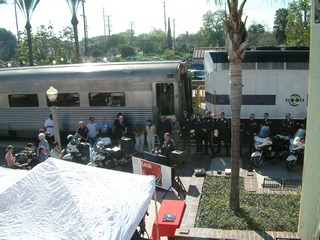
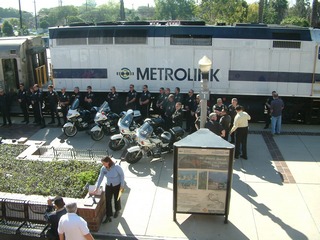
The Southern California Rail Safety
Team is a coalition
of rail operators, transit agencies and rail safety advocates.
The Team was formed in June of 2000 and includes members from
California Operation Lifesaver, the Federal Railroad Administration,
the
California Public Utilities Commission, Amtrak, Metrolink, the
Burlington Northern Santa Fe Railway, the Union Pacific Railroad, the
Pacific Harbor Line, the Coaster, and the Los Angeles County
Metropolitan Transportation Authority.
After the conclusion of the press
conference, media boarded the train which started its first east bound
run. Law enforcement started phase two using the Operation
Lifesaver train. The following views are from the Silver Lariat
passenger
dome car.
Below left is a photograph of the
Melrose Street overcrossing. This was constructed in late 2003
and all of 2004 and eliminated one highway-rail grade crossing.
Good food is available at the 301 Cafe in the center of the picture.
The two below photographs are of
Orangethorpe Avenue crossing, a major east-west arterial highway in
Orange County. From this point east, Orangethorpe parallels the
BNSF Railway for about 4 miles. According to the Metrolink
February 9, 2005 press release, the City of Placentia's "On Trac
project encompasses a seven-mile railroad-mitigation corridor with 14
rail crossings in the cities of Placentia, Anaheim and
Fullerton." The project is a several hundred million dollar
proposition to grade separate city streets from the railroad by putting
the tracks into a trench similar to the Alameda Corridor.
The below two photographs are Rose
Drive/Tustin Avenue highway-rail grade crossing which has been improved
by the County of Orange and the Burlington Northern Santa Fe Railway.
After Rose Drive/Tustin Avenue, the
train stopped to reverse movement.
Operation Lifesaver Fullerton Page 2
Richard Elgenson
RailNews Network Site
Email: Richard@TrainWeb.com